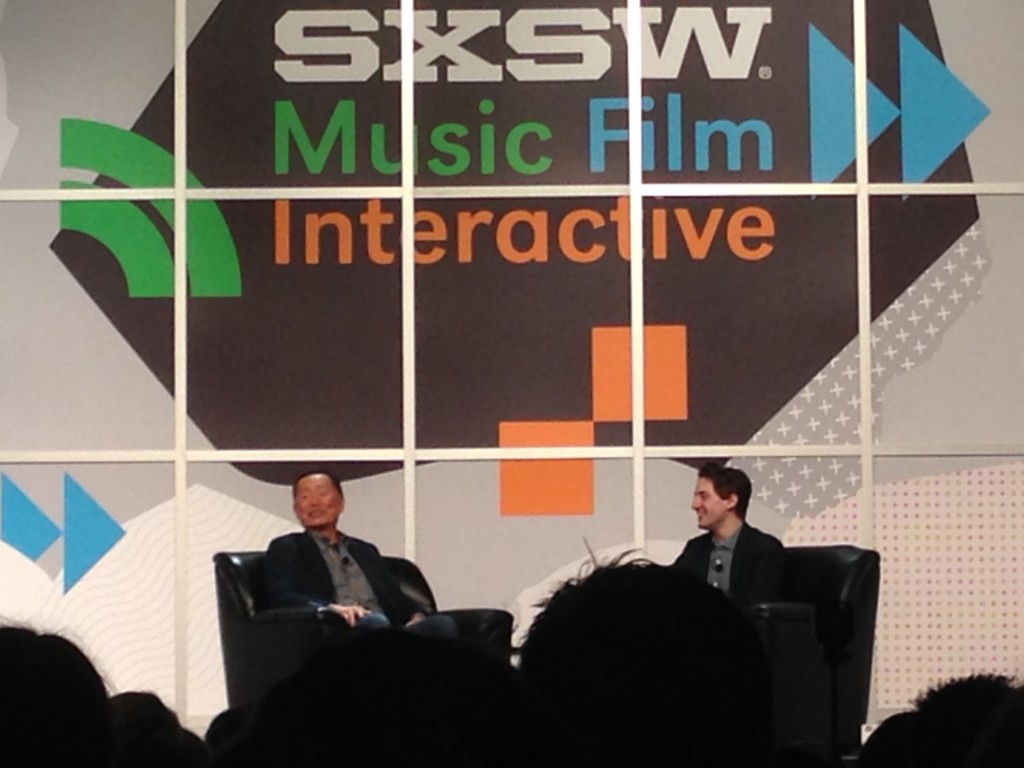Another SXSWi And Wow My Brain Hurts
This year marked my second South By Southwest Interactive experience, and now that a few days have passed since the conference ended I think I can begin to express some of the information that I learned.
My brain is recovering from an information hangover.
As always, there were some great panels and presentations and some that were mediocre. Rather than painstakingly combing through every talk I went to, I’ll pull out some highlights of the week.
Marketing is Science
 One of the more compelling talks I went to was on the data behind marketing language. Guy Krief from Persado discussed the vast research his firm has done on what type of language gets people to click or convert.
One of the more compelling talks I went to was on the data behind marketing language. Guy Krief from Persado discussed the vast research his firm has done on what type of language gets people to click or convert.
As many marketers know, there are three parts to a message: the action, the description, and the emotion. Action is the CTA, the actual thing you want someone to do: buy this, like this, friend us, etc. The description gives you the basic details: our green yoga pants fit underweight Boston Terriers.
Then there’s the emotion, which can be both positive and negative. Negative emotion (like “hurry!”) gets people to click but not to convert. Positive emotion (like “this is awesome!) gets people to convert. This is true across the globe with one exception: Latin America. The data shows that for some reason negative emotion works for conversions in Latin America.
Emotion is almost always good for reeling people in, except in the case of email subject lines. For email subject lines description is the best way to get a higher open rate, and in fact, emotion can trigger spam filters.
Persado has been able to gather this data only for messages that have a direct action that they can measure. For example, this can’t be applied to building brand awareness, creating billboards, etc. But they’ve been able to develop a science out of marketing messaging to increase ROI dramatically.
George Takei’s optimism gives me hope

Oh George Takei. He is funny, witty, relevant, articulate, insightful, and passionate. He spent years in a Japanese internment camp in the United States when he was a child, and even though he endured unjust imprisonment and discrimination, he still holds so much hope for this country.
Takei’s insights into Edward Snowden echoed something I’ve been thinking for a while: why did he flee to China and Russia, of all places? Takei remarked that Martin Luther King Jr. broke unjust laws and willingly went to prison for them, and from prison was able to transform the system.
Snowden instead fled to two countries whose surveillance states and records on human rights may be worse than the one Snowden is speaking out against. Takei’s biggest question to Snowden: What is your game plan?
Takei spoke about his success on Facebook as well, and reaffirmed an argument I always make: it takes time and strategy to build your fan base in a meaningful way. Takei created his Facebook presence with the end-goal of promoting a play he had created.
The play wasn’t debuting for over a year after he started Facebook. This means that he was spending a lot of time nurturing a community long before he promoted his product.
Neil deGrasse Tyson has made me a better parent
 Neil deGrasse Tyson. The guy is amazing. I jotted down about ten brilliant one-liners from him, but my favorite of his points were about parenting. Let your kids experiment. Let them break stuff and bang on pots and pans, and learn about the world by exploring it. Nurture their curiosity constantly. This is what builds scientists.
Neil deGrasse Tyson. The guy is amazing. I jotted down about ten brilliant one-liners from him, but my favorite of his points were about parenting. Let your kids experiment. Let them break stuff and bang on pots and pans, and learn about the world by exploring it. Nurture their curiosity constantly. This is what builds scientists.
He had a wonderful story about his daughter and the tooth fairy. He didn’t want to lie to his daughter, so when she asked him he said “I’ve heard that when you put your tooth under the pillow you might get money.”
His daughter and her friends began to suspect that their parents were behind the tooth fairy. So they came up with a hypothesis and a method for proving the hypothesis.
When the next child in the group lost a tooth she didn’t tell her parents about it and put it under her pillow that night. The tooth fairy didn’t come. Now the children had a conclusion. But because they all wanted the money they kept believing any way (and told their parents each time they lost a tooth).
Tyson made me feel better about letting my daughter explore and make noise and make mistakes. And now I have some better ideas on how to address the magical experiences of childhood without lying to my daughter.
Not everyone is obsessed with exit strategy
One of the more surprising and interesting events I attended was a meetup for “slowpreneurs.” Slowpreneur is a term that Denver local Mario Lurig uses to describe entrepreneurs who aren’t in it for the insanely fast lifestyle and exit strategy.
His creed is this:
I want to be patient. I want to grow within my means. I don’t want to incur debt. I will hold back the charging bull. I will continue to live my life. I will learn every day. I will let go of the reins when it’s ready. I will not be greedy. I will succeed.
At the meetup there were more than thirty entrepreneurs from all over the world (with a disproportionate number of Swedes, oddly), who were either tired of working 100 hours a week or who wanted to leave their current positions to start something new, but they wanted to do it in a way that wouldn’t force them to sacrifice what they love about their lives.
I really appreciate this movement. I want to spend time with my daughter, make time to write and play music, go on vacations where I can turn my phone off for a few days, and feel good about this one singular life I have.
Making sure a business runs smoothly is crucial, but that doesn’t necessarily mean you can’t have a full life outside of work. As the meetup attested, there are lots of entrepreneurial minded people out there whose love is greater than work.
Culture is ping pong. Culture is not ping pong.

Culture. Along with the words pivot, disrupt, and acquire, culture was another ubiquitous term at SXSW this year. I attended a couple talks on culture and I was sadly disappointed. However, there was an afternoon workshop that I really wanted to go to on creating a company culture “beyond ping pong.”
Unfortunately I was put on the waitlist and never got in. So why am I writing about it, you ask? Because I think we need to take our discussion of culture deeper. Ping pong tables and professional office chefs are amazing, but those things don’t get to the heart of what it means to work in a place with diverse interests, skill sets, and personalities.
I heard the CEO of a startup talk about how when people come into the office they hear the music playing and they know what a cool place it is. That made me cringe. What about people who want silence from time to time? People who need a little space to concentrate? Culture isn’t about playing ping pong or listening to music, it’s about feeling like who you are matters to your company. Let’s talk more about that.
Conclusion?
SXSWi is good but it’s exhausting. I’ll have to consider next year whether or not I have the strength to make it through five days of over-stimulation for a third year. I think I can make it. And I am seriously considering submitting a panel idea or two.

Have something to say?